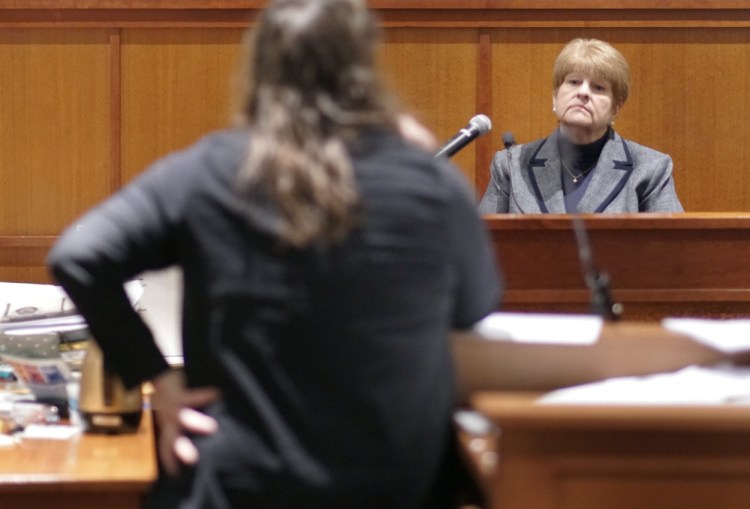The prosecutor who won the 1992 murder conviction against Anthony H. Sanborn Jr. said Friday that detectives in the case did not turn over their notes to her office, and that to expect officers to write a report about every person they spoke to during the investigation would be “overwhelming.”
Sanborn’s ongoing attempt to overturn his conviction for the 1989 murder of Jessica L. Briggs is based largely on allegations that the state did not turn over material and exculpatory evidence to his original defense team, as they are required to do, depriving him of his constitutional rights to a fair trial and due process.
Former Assistant Attorney General Pamela Ames’ comments came during the first 90 minutes of her testimony Friday, before Sanborn’s post-conviction review hearing was adjourned for the day because of an attorney’s illness.
Before the recess, Ames was not asked whether notes are typically turned over to her office, or if the practice of only turning over formal, typed police reports to the prosecutor was out of step with best practices at the time. She said on the stand that she trusts police officers to bring her information to use in a prosecution, and that while she works with them to bring a successful case, she does not direct them in their investigation.
“If a police officer would write a report about every single person he came in contact with in this case, it would be overwhelming,” she said. “They have to do their job and they have to have a filter as to what is really relevant to the case.”
Sanborn is trying to clear his name through a post-conviction review process that began in January and is culminating in the current evidentiary hearing in which his attorneys, Amy Fairfield and Timothy Zerillo, are laying out a case for why they believe Sanborn was wrongfully convicted and sentenced to 70 years in prison. He was granted bail in April after the only eyewitness to the murder, Hope Cady, recanted her testimony and said she was coerced into testifying by Portland police detectives who threatened to jail her if she did not comply.
The detectives have denied those allegations, and said they never coerced anybody in the investigation.
Sanborn’s defense team also has accused Ames, now a defense attorney in private practice in Waterville, of having suborned perjury when detectives and other witnesses lied under oath during Sanborn’s trial. Ames, in prior media interviews, has denied the allegations and maintains that the state of Maine prosecuted and convicted the right person for Briggs’ grisly murder.
Quickly after taking the stand, Fairfield began digging into the details of the prosecution, with an eye toward whether prosecutors and police complied with rules that require investigators to turn over all information to the defense that is both material and exculpatory.
At the time of the murder in 1989, police operated on an almost entirely analog system, according to prior testimony by Daniel Young and James Daniels, the two officers who investigated the case. Investigators took notes by hand on legal pads or flip-top notebooks as they interviewed witnesses. Those notes were then turned into narrative reports or first-person statements that were written long-hand, passed off to typists, and then handed back to detectives for corrections or alterations.
In her claims of wrongdoing, Fairfield is relying on a trove of documents that Daniels, the lead investigator, kept at his home since he retired from the Portland Police Department in 1998. The two cardboard boxes contained physical evidence, original case files and importantly, the notebooks with the handwritten records of interviews.
The Briggs homicide investigation began on May 24, 1989, when workers at a Bath Iron Works dry dock on the Maine State Pier found a pool of blood on the pier near the water. Briggs’ body was recovered a short time later from Portland Harbor. She had been stabbed and slashed to death.
Much of the eight days of testimony in the conviction-review hearing has involved comparisons between what Daniels and Young took down in their handwritten notes, and what was included in their typed reports.
Justice Joyce Wheeler, who is presiding over the case, will determine whether information was withheld, and whether that information would have led any reasonable juror during the original trial to have decided the case differently.
Testimony from Ames could take several days. The hearings, originally scheduled to last for 12 days until Oct. 25, are expected to go longer. The court clerks are holding Courtroom 8 at Cumberland County Unified Court for the hearings until they are complete, or until Wheeler leaves on vacation on Nov. 17.
Matt Byrne can be contacted at 791-6303 or at:
Send questions/comments to the editors.



